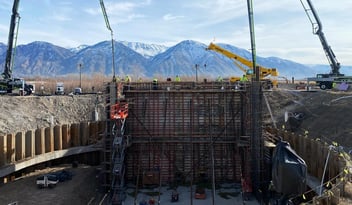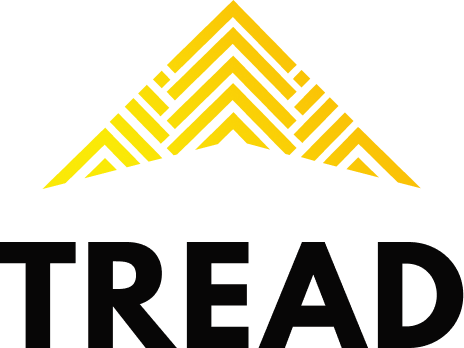Find Construction Jobs to Bid On: 5 Strategies
Winning bids in civil construction does not come without a well-thought-out and accurate proposal. The more proposals you win, the easier it is to grow your construction company into the powerhouse operation it is capable of becoming.
This blog will discuss the construction bidding process, how to find construction jobs to bid on, how to increase the success of your bids, and more.
The construction bidding process
The construction bidding process involves multiple steps, stages, and checkpoints. Project owners, general contractors, and subcontractors are all involved in the process of bidding.
Here is the bidding process breakdown:
- First, the construction project owner sends out or posts bid invitations. This includes project information (like drawings, plans, and specifications) and a request for proposal (RFP).
- General contractors see the RFP and request quotes from subcontractors and laborers for the work that needs to be done. This can be in the form of a bid package that includes project drawings, specs, addendums, and more.
- Subcontractors submit their quotes to the general contractors.
- General contractors use these quotes to create estimates that will be used to finalize their project bids.
- Bids are finalized and general contractors submit their bids to the project owner, which adds them to the bid list for that particular project.
- The construction project owner reviews the bids and selects a winning bid and the corresponding general contractor.
How do you get on a construction bid list?
General contractors typically get on bid lists through referrals or recommendations made to the project owner. Doing good work and having a good reputation will help get you on a bid list, as will networking and getting to know key decision-makers within the industry.
Once the general contractors are added to the bid list, the project owner sends an RFP or bid invitation to the contractors on the list. Creating a thorough, comprehensive, and competitive bid will help you stand out on a bid list. We have included some expert tips on this below:
What is included in a construction bid?
A construction bid includes the total cost of the work that is needed to complete a project or a specific portion of the project. Depending on the structure of the contract, the bid will generally be submitted as a lump sum. This includes subcontractor costs, general contractor costs, overhead, and profit.
At each level, everyone must make money, otherwise, their businesses would fold. This makes bidding competitively very tricky; as different contractors have different relationships with their suppliers and different costs for their manpower.
Items included in a bid:
- Materials
- Man-hours
- Machinery costs
- Engineering fees
- Drafting fees
- Supervision costs
- Mark up
- Subcontractors inclusions
- Insurance
- Transportation
- Storage
All these items can be negotiated with suppliers, labor forces, rental companies, etc.
Other items that can impact the success of a bid:
- Previous relationship
- Reduced schedule
- Alternate products
- Reduced profit
How do construction companies find clients?
Construction companies find clients by bidding on projects. There are multiple avenues available to construction companies to find projects to bid on including bidding websites, networking, word of mouth and more.
Let’s find out more:
How to find construction jobs to bid on
Unfortunately, construction jobs don’t just fall from the sky. Companies are required to bid on projects in order to get work.
The top construction bid sources in North America include:
- Construction bidding websites
- Online search
- Networking
- Cold communication
- Word of mouth
1. Construction bidding websites
Construction bidding sites are some of the fastest ways to find and bid on construction jobs. These sites give you access to projects in whatever area you are looking for. Create a free or paid account and filter by location, industry, and more to find your ideal construction bidding opportunity. Some civil construction sites include Infrastructure Civil Works and Construction Tenders and GovernmentBids.
We recommend saving your favorite ones, checking them regularly, and setting up alert notifications when new construction projects are posted. Most sites even allow you to customize these notifications for projects that are a good fit for your company.
2. Online search
Since new projects or project-sharing platforms can surface at any time, it is important to stay up-to-date to find more construction bid opportunities. Look for new developers and bidding websites and save them to your browser’s bookmark bar so you can check back regularly for new opportunities.
We also recommend closely following your competitors online. Check out their websites for project galleries or case studies. Keep a record of these past projects and make sure to build a relationship with those developers for future projects you may be better-suited for.
3. Networking
Sitting behind your desk is not the only way to find construction jobs. Going to events or conferences can help grow your professional circle and present new opportunities that may not have ever been presented to you if you just stayed in your desk chair.
4. Cold communication
Project decision-makers may not know about you unless you stick your neck out and try to build a new connection. If you want to create new relationships, don’t be too shy to make a call, send an email, or reach out over LinkedIn. Find out who the project decision-makers are and secure an informal meeting to learn more about their company, their projects, and their needs.
5. Word of mouth
Another way to learn about construction jobs is through word of mouth. This ties into networking and cold communication; the relationships built from creating new connections can open up new construction bid opportunities for your company.
How to increase the success of your bids
Winning construction bids often leads to winning more construction bids. The saying: “The reward for good work is more work” holds true in the construction industry.
Having a respectable bid-hit ratio is a great way to build your company’s reputation and win more bids. A bid-hit ratio is the win rate for projects you’ve bid on. It measures how many bids you’ve sent out against how many bids you’ve won. For public work, an ideal bid-hit ratio is 10 to 1. For private, 5 to 1 is more appropriate to strive for.
The industry’s “golden rule” of starting with highly accurate cost estimates and submitting the lowest bid amongst competitors is not always the right approach. Bidding the lowest does not mean you’re bidding competitively. A winning bid focuses on the quality and timeliness of the delivery of services and materials.
Here are 8 tips to increase the success of your construction bids:
- Connect with the client
- Bid first
- Know your competition
- Don’t bid on every job
- Include the extras
- Follow-up
- Make price adjustments
- Create accurate bids
1. Connect with the client
Meeting with the potential client before submitting your bid is a great way to get more information about their needs and what they are looking for on that particular project. Schedule a meeting to get in some face-time during the bidding process.
2. Bid first
Bidding first allows your company to make a statement, stand out, and set the bar. Dialing in your bidding strategy and process is essential to generating quick, accurate, and compelling bids. Using estimating software can improve the speed of your bid creation by 50% or more.
3. Know your competition
Understanding your competition and the criteria they use on bids can help you adjust accordingly. You’ll be able to better present and highlight your competitive advantage. Describe in detail what qualifies your company offers that makes you the best fit for the project.
Consider including your unique areas of expertise. This can be done by adding the following to your bid:
- Past project pictures and details
- Descriptive testimonials
- Certifications and awards
Knowing your competition also gives you the opportunity to go places they don’t or won’t go. What are some projects or areas they refuse to tap into or bid on? Are these areas you have some expertise and could excel in?
4. Don’t bid on every job
‘The more the merrier’ is a saying that should not apply to construction bids. Bidding on construction projects should be done strategically. This means bidding on projects that you think you might actually win. These projects are ones that fit your niche and align with your scope. If a project requires specialties that you don’t have, don’t bid.
When you bid on projects that are a good fit, it conserves administrative manpower and decreases the amount of work that will need to be contracted out if you win.
You should also be thinking long-term and focusing on construction projects that will result in repeat business (when possible).
5. Include the extras
If you are offering any compelling differentiator (or “extras”), be sure to include those in your proposal. Clearly list how your firm will go above and beyond expected levels of quality and service for this specific project to really stand out above the rest.
6. Follow-up
Once you’ve submitted your bid, you can follow up with the company. Confirm they received your proposal, open a line of communication, should they have questions and want to reach out, and consider asking who else has bid on the project and at what price.
7. Make price adjustments
If the potential client informs you that your bid is too high, this is when you could consider a price adjustment. Start by asking where competitors have bid to see if you can work on lowering your price to match or compete.
8. Create accurate bids
The difference between your final bid amount and your estimated expenses is your profit. Bidding accurately benefits everyone during a project. If your bids are overestimated, this decreases your chances of winning the project. If your bids are underestimated, this increases your chances of going over budget or causing financial friction between parties.
Using a management system that collects the same operational data used to create estimates is one of the best ways to increase bid accuracy.
Tread is a fleet management software that accurately tracks fleet and driver data for better forecasting and estimating on future project bidding. Once the bid is won, Tread can be accessed by all parties for full visibility into project progress, ticketing, and equipment location in real-time.
Request a demo today to learn how our software can help you win more bids in the construction industry.
Read On

How to Use the Critical Path Method in Construction
Most construction projects are very complex, with many overlapping and connecting tasks. It is...

What Is a Construction Punch List? [Questions & Tips]
Civil construction is an essential and valuable industry. It is responsible for connecting...

Safe and Efficient Construction Waste Disposal Guide
Whether you’re paving roads, building skyscrapers, or renovating an existing structure, waste is an...

